English_content
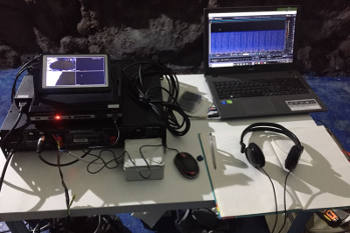 Short description
Short description
The experimental activities carried out at the BioSoundEcology Lab in Messina are focused on the analysis of biological underwater acoustic sources and the study of the ecological dynamics of marine vertebrates and invertebrates in polar habitats. In addition, the impacts of anthropogenic acoustic sources on the ecology, physiology and behaviour of marine organisms are assessed. In particular, through the study of the sounds generated by animals, the biological and ecological aspects are investigated. The analysis of the noise from human activities provides useful elements for understanding the effects on animals through the study of their behavioural and physiological responses.
Matrices of interest
The activities are mostly ascribable to marine habitats.
Study techniques
At the BioSoundEcology Lab, acoustic data acquisition in field/controlled environment and assessment of animal responses to environmental noise disturbance are carried out, in particular:
- Acoustic data analysis;
- Estimation of underwater noise and environmental acoustic components;
- Evaluation of ecological dynamics through the analysis of the vocalizations of marine animals;
-Analysis of the biochemical, physiological and behavioural responses of animals exposed to acoustic disturbance;
- Study of the acoustic ecology of marine mammals.
Instrumentation
The Lab is equipped with instrumentation for passive acoustic monitoring in the field (hydrophones and autonomous acoustic data acquisition systems) and for studies of the effects of noise on marine organisms in controlled environment (cameras, amplifier, acoustic transducer, software for acoustic and behavioral analysis).
For details: Dr. Francesco Filiciotto – francesco.filiciotto AT cnr.it
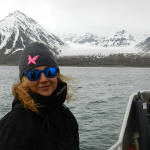 She graduated in Biological Sciences and then obtained a PhD in Polar Sciences in 2003 always at the University of Siena.
She graduated in Biological Sciences and then obtained a PhD in Polar Sciences in 2003 always at the University of Siena.
The main lines of research are aimed at understanding the sources, flows, distribution and fate of persistent and emerging organic contaminants (POPs) in polar and temperate ecosystems. Recent studies are focused on the study of the transfer of emerging POPs between abiotic (water, sediment) and biotic (trophic networks) compartments and between trophic levels; bioaccumulation and biomagnification and related factors; and on the toxicity risk assessment (TEF method, TEQ) in marine food webs, also through the use of sentinel organisms, to assess the risk for humans and for the ecosystem. She promotes the study of protected species or living in protected areas through the use of non-destructive and non-lethal sampling methods. Development and optimization of methods for the determination of emerging organic contaminants.
She has participated in several expeditions to Antarctica as part of the National Research Program in Antarctica and to the Arctic: Svalbard and Greenland, the latest as part of an international project on the effects of climate change on Arctic organisms (TUNU Program: Arctic Ocean Fishes - Diversity, adaptation and conservation '' UiT The Arctic University of Norway).
Scopus - Author ID: 7801563492 ![]() http://orcid.org/0000-0002-1875-6530 Google Scholar
http://orcid.org/0000-0002-1875-6530 Google Scholar
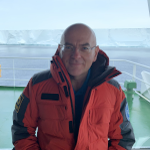 ANTONELLI GIUSEPPE - Segretario amministrativo
ANTONELLI GIUSEPPE - Segretario amministrativo
E-mail: giuseppe.antonelli AT cnr.it
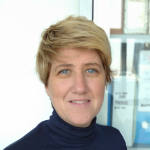 CESTER VALENTINA
CESTER VALENTINA
E-mail: valentina.cester AT cnr.it
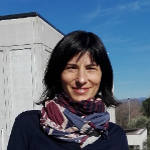 CIALLI PAMELA
CIALLI PAMELA
E-mail: pamela.cialli AT cnr.it
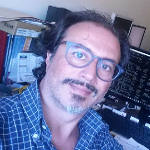 COSENZA ALESSANDRO
COSENZA ALESSANDRO
E-mail: alessandro.cosenza AT cnr.it
 DI LEO GUGLIELMO
DI LEO GUGLIELMO
E-mail: guglielmo.dileo AT cnr.it
 NOGAROTTO ALESSIO
NOGAROTTO ALESSIO
E-mail: alessio.nogarotto AT cnr.it
SACCHETTO ALESSIO
E-mail: alessio.sacchetto AT cnr.it
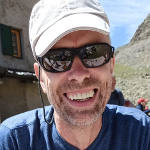 ZANELLA JACOPO
ZANELLA JACOPO
E-mail: jacopo.zanella AT cnr.it
 ZANOTTO EMANUELA
ZANOTTO EMANUELA
E-mail: emanuela.zanotto AT cnr.it
 Bachelor in oceanography at Federal University of Rio Grande. Erasmus Mundus double master degree in Water and Coastal Management (WACOMA) at University of Bologna, University of Cadiz and University of Algarve. Since 2022 is a PhD student in Polar Sciences at Ca’Foscari University of Venice and at the National Institute of Oceanography and Applied Geophysics (OGS). Currently focusing the thesis in the ocean circulation in the Southern Ocean using ARGO float mesurements.
Bachelor in oceanography at Federal University of Rio Grande. Erasmus Mundus double master degree in Water and Coastal Management (WACOMA) at University of Bologna, University of Cadiz and University of Algarve. Since 2022 is a PhD student in Polar Sciences at Ca’Foscari University of Venice and at the National Institute of Oceanography and Applied Geophysics (OGS). Currently focusing the thesis in the ocean circulation in the Southern Ocean using ARGO float mesurements.
 Environmental scientist, graduated at the University of Bologna.
Environmental scientist, graduated at the University of Bologna.
Since 2022 she is PhD student in Polar Science at the university Ca'Foscari (Venice), with a focus on the photochemistry of mercury at snow-air interface in polar regions.
 He comes from ENEA where he gained experience in administration, including being responsible for the administration of the Consortium for the Implementation of PNRA S.c.r.l. and R.U.P. for various procedures, and logistics activities. He had the opportunity to participate in some Antarctic campaigns at Mario Zucchelli Station and aboard the R/V Laura Bassi. In logistics since 2007, he had the responsibility of the ENEA office in Christchurch and the service contract with the shipping/customs agent in Hobart, as well as the management of air, sea and land shipments of PNRA related materials, also taking care of the customs aspects.
He comes from ENEA where he gained experience in administration, including being responsible for the administration of the Consortium for the Implementation of PNRA S.c.r.l. and R.U.P. for various procedures, and logistics activities. He had the opportunity to participate in some Antarctic campaigns at Mario Zucchelli Station and aboard the R/V Laura Bassi. In logistics since 2007, he had the responsibility of the ENEA office in Christchurch and the service contract with the shipping/customs agent in Hobart, as well as the management of air, sea and land shipments of PNRA related materials, also taking care of the customs aspects.
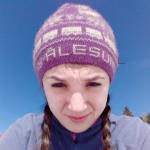 Current position: Researcher at Institute of Polar Sciences-CNR, Venezia; permanent position.
Current position: Researcher at Institute of Polar Sciences-CNR, Venezia; permanent position.
Previously: post-doc researcher at the Department of Environmental Sciences, Informatics and Statistics of Ca’ Foscari University of Venice after she obtained a PhD in Science and Management of Climate Change from the same university (2016). Study grant holder at the Department of Environmental Sciences, Informatics and Statistics of Ca’ Foscari University of Venice since 2011, after the master’s degree in Environmental Sciences.
Among her main research interests are atmospheric sampling and monitoring, gas chromatographic-mass spectrometric analyses and development of analytical methods for the determination of persistent organic pollutants in the atmosphere and of biomarkers in lake sediments. Her present activity is mainly focused on the characterization of organic proxies in sediments, soils and stalagmites, aimed in particular at reconstructing paleofires, human presence and the composition of vegetation during the Holocene.
She collaborated and collaborates to several national and international (EU-FP7, EU-H2020, NSF-DEB) research projects and coordinates the “BioCyCLeS” project, funded under the National Antarctic Research Program (PNRA 2018). She co-authored 14 papers on international journals with more than 240 citations (h-index 7). She co-supervised 12 degree theses and took part in the scientific secretariat and logistical organization of the Annual Conference of the Italian Society for Climate Sciences (SISC) in 2017 and 2018.
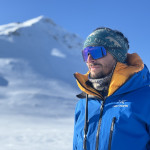 Snow scientist and technical manager of the EuroCold Lab laboratory system of the Department of Environmental and Earth Sciences (DISAT) of the University of Milan-Bicocca. He gained a PhD in Polar Sciences at the Ca' Foscari University of Venice with a thesis on the optical properties of mineral dust in snow and has a background in geology and Earth sciences. He has participated in many missions in Arctic, Antarctica and the Alps both as a scientific leader and as field risk manager. For some years he has been a national instructor of the Italian Avalanche Service and a professional member of the American Avalanche Association.
Snow scientist and technical manager of the EuroCold Lab laboratory system of the Department of Environmental and Earth Sciences (DISAT) of the University of Milan-Bicocca. He gained a PhD in Polar Sciences at the Ca' Foscari University of Venice with a thesis on the optical properties of mineral dust in snow and has a background in geology and Earth sciences. He has participated in many missions in Arctic, Antarctica and the Alps both as a scientific leader and as field risk manager. For some years he has been a national instructor of the Italian Avalanche Service and a professional member of the American Avalanche Association.
The polar atmosphere is characterized by high stability and a the strong thermal inversion that occurs in these regions (the temperature increases with increasing altitude with respect to the ground, as opposed to what happens at mid-latitudes), both phenomena are a consequence of the almost perpetually frozen ground that is often covered with snow and ice. This also applies to the frozen surface of the sea, when covered by ice.
Another important element of the polar atmosphere is the presence of the so-called polar vortex, a swirling motion of the air masses around the pole that keeps the cold polar air masses separate from the warmer ones in mid-latitudes.
Knowledge of the thermodynamic characteristics of the polar atmosphere is fundamental studying the biogeochemical cycles of natural species and long-distance transport processes of atmospheric components from populated areas.
The research activities carried out at ISP are aimed to deepen the knowledge of the processes and the interactions between the different components of the climate system, in particular at the interfaces air-snow-soil and air-sea-sea ice.
Atmospheric composition
The polar regions represent an open laboratory to study the biogeochemical cycles of natural species, the atmospheric chemical transformations in an uncontaminated continent, as well as the transport processes from the middle and low latitudes. Several constituents characterize the atmospheric composition, among which the so-called greenhouse gases (such as water vapor, carbon dioxide and methane whose concentrations are influenced by anthropogenic activities and natural processes), and aerosols are of considerable importance. The latter have a major impact in the polar regions because they are strongly linked to the feedback processes that amplify climate change.
The atmospheric aerosol is composed of particles suspended in the atmosphere, which can be of natural origin (through the lifting by winds of particles from bare or desert surfaces, of marine spumes and of volcanic origin or linked to large fires) or anthropogenic (industrial and fuel emissions). The study of the chemical composition of Antarctic and Arctic aerosols is one of the key points in polar research. These studies are performed through the use of specific chemical tracers, such as water-soluble components, organic acids, sugars, phenolic compounds, amino acids, trace elements or rare earths. Aerosol plays an important role in climate regulation by interacting with solar radiation and modifying the microphysical properties of clouds.
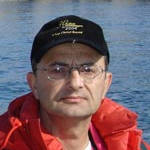 His scientific activity has been devoted to the control of chemico-physical and biological parameters of sea-water, with particular regard to the nutrient evaluation, both by traditional techniques and by means of instruments on line analysis (mobile station, oceanographic buoy) and to the evaluation of trophic parameters (chlorophyll a, ATP).
His scientific activity has been devoted to the control of chemico-physical and biological parameters of sea-water, with particular regard to the nutrient evaluation, both by traditional techniques and by means of instruments on line analysis (mobile station, oceanographic buoy) and to the evaluation of trophic parameters (chlorophyll a, ATP).
From 1990 he is responsible of the laboratory of chemical oceanography. He participated in several oceanographic cruises of national and international programs. Mission chief of several oceanographic cruises in the Mediterranean Sea. From 1989 has participated national program for the research in Antarctica.
He participated in the following Italian scientific expeditions to Antarctica: X Italian-Belgian-U.S. within ROSSMIZE (1994/95), XIX VLT (2003/04), XX ABIOCLEAR (2004/05), XXXI CEFA (2015-2016) e XXXII P.ROSE e CELEBER (2016-2017) programme. He produced about 100 scientific publications.
Scopus - Author ID: 8516485200
More...
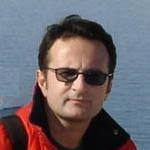 He has obtained two degrees (Biological Sciences; Natural Sciences) and a PhD in Marine Sciences and Engineering.
He has obtained two degrees (Biological Sciences; Natural Sciences) and a PhD in Marine Sciences and Engineering.
His research activities are mainly focused on the study of the functioning of polar ecosystems with an interdisciplinary approach dedicated to various topics ranging from microbial ecology and the study of the microbial food web, to the study of biodiversity and the functioning of marine and terrestrial ecosystems.
During his career he has addressed issues related to the development of new technologies in polar areas (areas marginal to marine glaciers), the effects of pollution (heavy metals, oil, plastics, etc.) and global changes on marine and terrestrial microbial communities. Attention was also paid to the conservation and protection of terrestrial and marine ecosystems with particular reference to the Antarctic Treaty Consultative Meeting (ATCM) and the Commission for the Conservation of Antarctic Marine Living Resources (CCAMLR).
He in thirty years of research has carried out a fervent field activity in a wide spectrum of marine and terrestrial environments: permafrost, sea ice, lakes (temperate and frozen), fjords, transitional areas, coastal areas, pelagic areas (Epi-, meso- and bati-pelago), marginal seas and polar areas. Overall, it has participated in national and international research projects (> 50), in over 60 scientific expeditions in Arctic, Antarctica (in 3 scientific coordinator of the expedition), China, Pacific Ocean, Atlantic Ocean and in the Mediterranean Sea (in 7 as Head of Mission).
During his career he has published more than 100 publications in national and international journals. Since 2019 he is responsible for the section of the Institute of Polar Sciences of Messina.
Scopus - Author ID: 6602752439
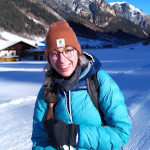 glaciologist with a degree in Atmospheric and Cryospheric Sciences from the University of Innsbruck, where she specialised in the study of the energy balance of cold-based Alpine glaciers. Her main research interest is the evolution of glacial albedo in the accumulation areas of Alpine glaciers, which are progressively turning into ablation areas due to climate change. She worked for the Institute for Interdisciplinary Mountain Research (Austrian Academy of Sciences, ÖAW), developing algorithms for analysing weather station data and participating in the glaciological monitoring of Jamtalferner. Outside of academia, she is vice-president of the Austrian section of Girls* on Ice, where she acted as leader and scientific instructor on the 2024 expedition. She also collaborates with Protect Our Winters Italia, delivering workshops in schools and writing articles for L'Altramontagna.
glaciologist with a degree in Atmospheric and Cryospheric Sciences from the University of Innsbruck, where she specialised in the study of the energy balance of cold-based Alpine glaciers. Her main research interest is the evolution of glacial albedo in the accumulation areas of Alpine glaciers, which are progressively turning into ablation areas due to climate change. She worked for the Institute for Interdisciplinary Mountain Research (Austrian Academy of Sciences, ÖAW), developing algorithms for analysing weather station data and participating in the glaciological monitoring of Jamtalferner. Outside of academia, she is vice-president of the Austrian section of Girls* on Ice, where she acted as leader and scientific instructor on the 2024 expedition. She also collaborates with Protect Our Winters Italia, delivering workshops in schools and writing articles for L'Altramontagna.
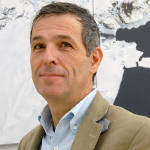 Director from the 1st May 2020 until the 30th April 2024.
Director from the 1st May 2020 until the 30th April 2024.
Full Professor at the Ca’ Foscari University of Venice, he has been dealing with analytical methods development and paleoclimatic reconstructions since many years. He has participated in several expeditions in polar regions and in the Alps and is author of more than 250 publications in high impact scientific journals (h-index 45).
Professor of Earth's Climate at Ca' Foscari Harvard Summer School, he has been recently granted by the European Research Council with a prestigious Advanced Grant. He has been professor at the Accademia Nazionale dei Lincei (2012-2014) and is an elected member of the Accademia delle Scienze detta dei XL and of the Istituto Veneto di Scienze Lettere ed Arti. He is currently past-President of the Italian Society for Climate Sciences and National Representative in the H2020 Programme Committee on Climate Action, Environment, Raw Material and Resource Efficiency.
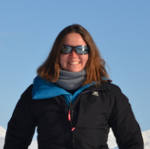 Ph.D.: Researcher at Institute of Polar Sciences-CNR (ISP), Venice, Italy;
Ph.D.: Researcher at Institute of Polar Sciences-CNR (ISP), Venice, Italy;
2013 to 2018 - Post-doctoral fellowship, Ca’ Foscari University, Venice, Italy and Institute for the Dynamics of Environmental Processes-CNR (IDPA), Venice, Italy;
2010-2012 PhD student in Chemical Sciences.
Research interests:
- Environmental chemistry; Her research is mainly focused on the investigation of chemical markers in several environmental compartments (ice, snow, aerosol, lake water, sediments) to define sources and transport processes mainly in the remote polar areas (Arctic and Antarctica).
- Development of very sensitive analytical methodsusing liquid chromatography coupled with tandem mass spectrometer (HPLC-MS/MS) and ion chromatography coupled with mass spectrometers (IC/MS) to investigate several chemical compounds at trace and ultra-trace concentration.
She has a deep experience in sample preparation in clean labs to determine organic compounds at trace and ultra-trace concentrations. She has participated in several scientific campaigns in the polar regions (Antarctica and the Svalbard Islands). Publications and bibliometrics H-index: 12 (Scopus); 41 scientific (SCOPUS) papers.
>50 poster and oral communications at scientific meetings; 2 invited oral presentations at international and national meetings National and International Appointments
2019-2015 Researcher under International Arctic Campaigns (Ny Alesund, Svalbard);
2012, 2014 Researcher under Antarctic campaigns (on-board Italica vessel and at Mario Zucchelli Station); Research projects
2018 - 2019 RCN - SSG- Spatial Distributions of Black Carbon and Mineral Dust in Air and Snow Surface Layers upon Svalbard Glaciers: participant;
2017-2019 PNRA - EvASIon - Mercer and Whillans lakes: Evolution of hydrologically Active Subglacial environments: participant;
2016-2017 RCN - SSG– Community Coordinated Snow Study in Svalbard: participant;
2012-2014 PNRA - CaBiLA: Geochemical characterization of Antarctic subglacial lakes: participant;
2012 - 2016 EU – Early Human Impact: participant
Scopus - Author ID: 46961088400 ![]() http://orcid.org/0000-0003-2639-7475 Google Scholar
http://orcid.org/0000-0003-2639-7475 Google Scholar
 Ministero dell'Universita e Ricerca
Ministero dell'Universita e Ricerca
Programma Ricerche Artico
Programma Nazionale di Ricerca in Antartide
 Ministero degli Affari Esteri e della Cooperazione Internazionale
Ministero degli Affari Esteri e della Cooperazione Internazionale
L'Italia e l’Artico
L’Italia e l’Antartide
CNR-ISP
National Research Council
Institute of Polar Sciences
c/o Scientific Campus - Ca' Foscari University Venice - Via Torino, 155 - 30172 VENEZIA MESTRE (VE)
Phone: +39 041 2348547 - E-mail: protocollo.isp AT pec.cnr.it
Fax: +39 041 2348 549 - Codice Fiscale: 80054330586 - P.I.:02118311006
Unless otherwise indicated, the content of this site is licensed : Attribution Non Commercial Share Alike 4.0 International (CC BY-NC-SA 4.0)
Privacy policy e Cookie policy - Transparent administration (CNR)








